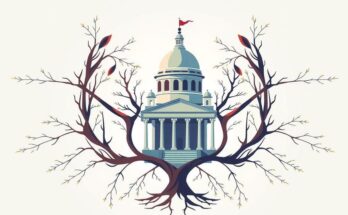Cameroon is set to face elections in 2025 where President Paul Biya, at 91, is likely to run for his eighth term. Despite ongoing civil unrest and economic struggles during his 42-year rule, Biya has maintained significant political support. The fragmented opposition struggles to present a clear alternative, while public demand for reform grows amid calls for better governance from the Church and civil society.
In 2025, Cameroon is anticipated to see President Paul Biya, 91, seek an eighth term, reinforcing his status as Africa’s longest-serving leader. Dr. John Akpo, a political commentator, affirms the certainty of Biya’s candidacy, despite concerns over his health. The ruling party, CPDM, is preparing for the elections, with party member Elvis Ngolle Ngolle stating that discussions about succession are premature.
President Biya has governed Cameroon for over 42 years and could be 99 if re-elected in 2032. Despite having some opposition backing, Akpo questions their authenticity, labeling them as satellite parties created to mitigate true opposition. Many Cameroonians express discontent with the situation.
Although credited with establishing multi-party democracy and enhancing ties with the West, Biya’s leadership has been marred by a civil war that undermines economic growth. Opposition lawyer Tamfu Richard claims that Biya’s age hinders his ability to address ongoing crises effectively, noting that he lacks firsthand knowledge of the affected regions.
Governance under Biya has been characterized by political repression, with many protests met with significant governmental backlash. Maurice Kamto, a notable opposition leader, was imprisoned without charges following his attempt to challenge Biya in the 2018 elections, illustrating the regime’s aversion to dissent.
The ruling CPDM party relies heavily on smaller coalition partners such as MDR and UPC to maintain legislative control. However, their support is dwindling, as evidenced in past elections where both parties performed poorly. Their alliance is somewhat artificial, created to counteract the rise of Kamto and his supporters.
Recent comments from Catholic bishops about power transfer and improved living conditions have sparked debate in government circles. However, church representatives deny that any resignation demands were made and insist their role is to advocate for the welfare of citizens, reflecting the church’s significant societal influence.
Currently, Cameroon is experiencing a challenging economic climate, with real GDP growth slowing down to 3.3% in 2023. A combination of inflation, fiscal policies, and conflicts has contributed to this decline. While there was modest recovery early in 2024 with a GDP growth of 3.7%, poverty remains pervasive, with roughly 23% of the population living in extreme conditions.
Analysts argue that addressing infrastructural deficiencies and reducing reliance on commodity exports is essential for sustainable growth. However, uncertainty looms over whether Biya will tackle these challenges given his advanced age and the fragmented opposition, which fails to present viable alternatives. Michele Ndoki, an opposition lawyer, suggests that the public’s prevalent desire for stability under Biya may outweigh the need for change.
The impending election in Cameroon is framed against the backdrop of Paul Biya’s longstanding presidency and the nation’s socio-political climate. After over four decades in power, Biya’s health and capability to govern continue to be contested issues. Despite ongoing civil strife and economic challenges, Biya retains significant political support, although the opposition remains weak and divided, leading to questions about potential succession and the future of governance in Cameroon.
Cameroon’s political landscape is deeply influenced by the aging President Paul Biya, whose potential eighth term raises concerns about the country’s future under his continued rule. The combination of discontent among the populace, weakened opposition, and unresolved socio-economic issues presents a complex scenario as the nation approaches the elections. Without a viable alternative, Biya’s incumbency may perpetuate existing challenges, even as voices from within the Church and civil society call for change and better living conditions for all citizens.
Original Source: www.dw.com




